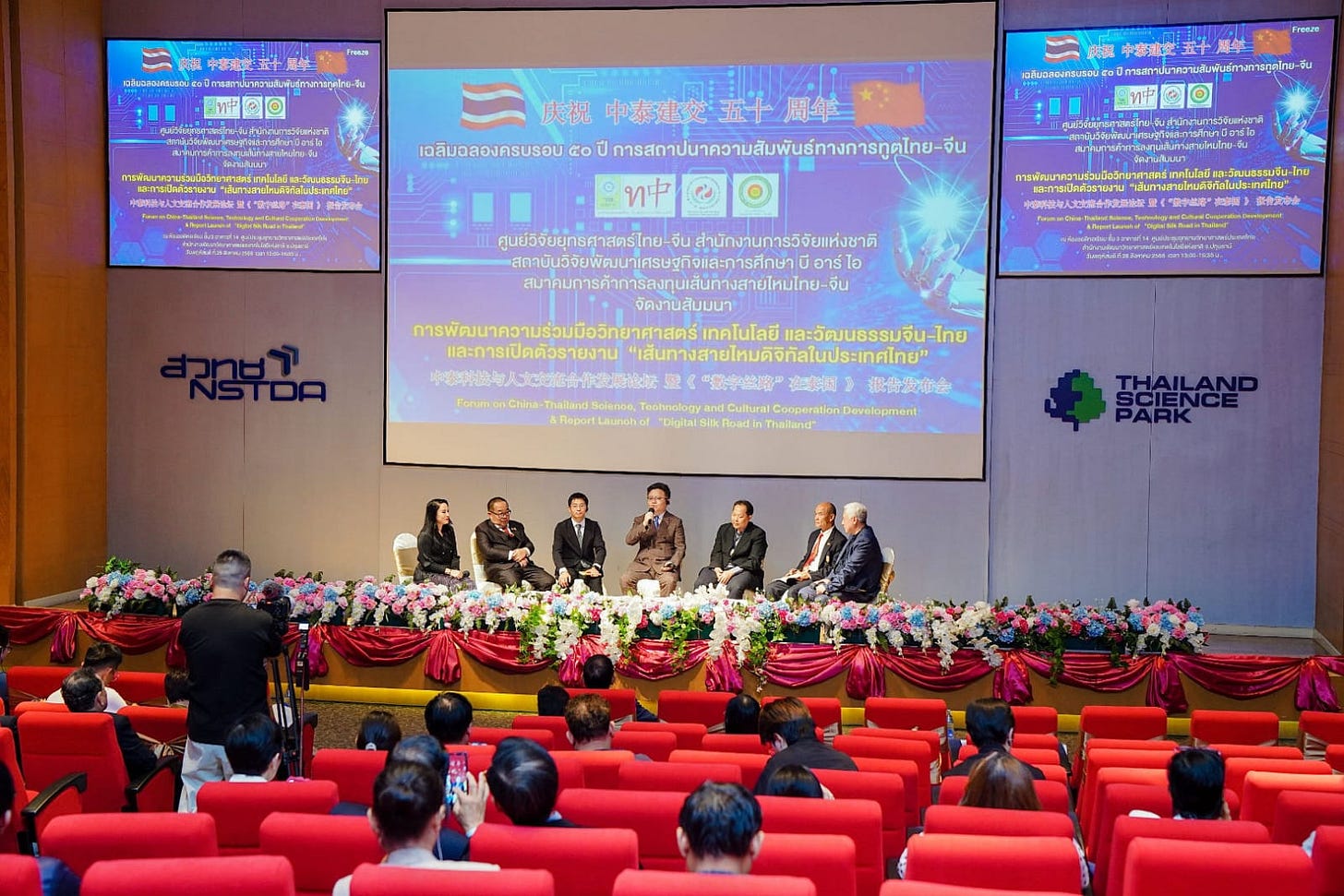Thailand’s Digital Transformation Gets a Boost from China Tech and Investments
Thailand is positioning itself as a digital hub, drawing Chinese tech companies with its youthful market, regional gateway status, and state-backed push for innovation

The growing popularity of Chinese apps and technology is accelerating Thailand’s digital transformation, with mobile payments, short videos, e-commerce, cloud computing and artificial intelligence becoming increasingly popular in the Southeast Asian nation.
These trends were highlighted in a report titled ‘Digital Silk Road in Thailand’, which was issued by several government and private sector bodies to mark the 50th anniversary of diplomatic relations between China and Thailand.
Chinese influence is visible across many sectors, but the report goes further by putting numbers to the trend: in e-commerce, 45.4% of Thai consumers choose Chinese platforms for the wide range of attractively priced goods, while over a third of Thai merchants frequently purchase goods through platforms like Taobao and JD.com.
TikTok and Chinese anime are hugely popular among Thai youth, with usage rates exceeding 90%. Online games such as Genshin Impact and Honor of Kings, along with web literature like WEBNOVEL, have large followings.
Among Thai corporates, 66.7% of those surveyed find Chinese AI products, represented by DeepSeek, to be "very convenient", according to the report, which was launched on 28 August 2025 at the Forum on China-Thailand Science, Technology and Cultural Cooperation Development in Bangkok.
Thailand, with a population of 70 million, is traditionally known for tourism, agriculture, and manufacturing - it even exports more cars than Italy. But with tourism slowing and manufacturing exposed to global risks, the country is now pivoting to cloud, AI, and digital services to fuel its next growth phase.
Thailand’s Digital Ambitions
The Thai government has a number in mind. It wants the digital economy to make up nearly 30% of GDP by 2030, up from 6% currently. That target sits at the heart of the Thailand 4.0 strategy, a blueprint for rewiring the economy with new infrastructure, data centers, and high-speed internet to power e-commerce, cloud and fintech. AI, robotics, and biotech are flagged as growth engines, while agriculture and manufacturing are being upgraded into smart industries.
Domestic champions are driving the shift. True Corporation is embedding AI into its services, while True IDC has launched the country’s first AI hyperscale data center. AIS is trialing 5G-powered factories in the government-backed Eastern Economic Corridor (EEC), and Kasikornbank is rolling out AI credit scoring and launching the country’s first licensed digital asset custodian.
Global tech heavyweights are taking notice. Microsoft is building its first regional data center, Amazon Web Services is investing $5 billion over 15 years, and Google has pledged $1 billion for a new cloud region in Chonburi (part of the EEC). AI workloads already make up nearly 30% of Thailand’s data center capacity, up sharply from last year, as local operators work with Nvidia and other partners to design GPU-heavy systems.
Japan and South Korea are making big bets of their own. NTT Data is investing $90 million in its third Bangkok data center. Meanwhile NEC and Fujitsu are piloting private 5G and smart-city platforms. On the Korean front, Samsung continues to influence Thailand’s digital lifestyle, hosting a June 2025 tech seminar in Bangkok to unveil AI-powered home appliances, including voice-enabled refrigerators and SmartThings-integrated systems tailored for the region’s climate.
China’s Digital Footprint in Thailand
Alongside these investments, China’s role stands out for its breadth. What began with popular apps has expanded into cloud services, infrastructure, and, increasingly, localization.
A vivid example is Alibaba’s Taobao, which recently launched a Thai-language version. Just over a month after the rollout, Taobao saw new users in Thailand surge by 60% year on year, according to Alibaba International Digital Commerce Group. The app now allows browsing in Thai and payments in baht, using Alibaba’s AI translation tools to make the platform more accessible to local shoppers.
Infrastructure as Strategy
Alibaba has announced a second data center in the country, while Huawei and Tencent are also rolling out cloud services to serve both enterprises and government clients. As per the ‘Digital Silk Road in Thailand’ report, 74% of Thai companies are already using Chinese cloud services, with nearly 60% describing them as “very convenient.”
A case in point is Tencent Cloud’s partnership with CP AXTRA, part of the Charoen Pokphand Group, which developed a ‘digital intelligence system’ to optimize inventory, promotions, and scaling, a showcase of how cloud can modernize Thai retail.
Many of these investments are anchored in the government-backed EEC.

Consumer Life Rewired
The influence of Chinese tech is most visible in daily transactions. According to the ‘Digital Silk Road in Thailand’ report, mobile payments now cover Thailand’s core tourism and commercial areas, with 61% merchant penetration in Bangkok’s busiest shopping districts.
Bangkok’s BTS Skytrain, the city’s elevated metro system, now accepts Alipay and WeChat Pay as part of that push. For now, though, the service is limited mostly to Chinese visitors, since it requires a China-linked bank account. Most Thai commuters still rely on Rabbit cards, bank cards, or local wallets like TrueMoney Wallet and LINE Pay.
Retailers are tapping into this digital bridge that links the two countries’ payment systems. Big C, one of Thailand’s largest supermarket chains, has launched a WeChat mini-program that allows Chinese consumers to purchase Thai products directly from China, without setting foot in Thailand.
Thailand’s largest food delivery platform, LINE MAN, has gone a step further by launching a WeChat mini-program to help Chinese visitors order meals from over 12,000 restaurants nationwide. To support the service, LINE MAN even trains riders in basic Chinese, turning digital convenience into cultural exchange.
Screens, Streams & Soft Power
Pop culture may be where China’s digital footprint runs deepest. As mentioned, usage of TikTok and Chinese anime among Thai youths exceeds 90%. Tencent’s WeTV is gaining ground in Thailand’s crowded streaming market, with nearly 80 million downloads and 5 billion views in 2024.
Cultural crossovers include Tencent’s co-production of Chuang Asia Thailand, a talent show blending Thai and Chinese pop culture.
Experts at the Bangkok forum described web dramas, online games, and web literature as the “three new digital products in cultural exchange,” helping to break down geographical and language barriers while strengthening people-to-people ties between China and Thailand.
Thailand as a Testbed
Thai enterprises already find tools like DeepSeek “very convenient”. What sets Chinese AI firms apart is their focus on open-source strategies, cost efficiency and localization, an approach that resonates in Thailand, where scaling adoption without heavy infrastructure costs is critical.
That advantage is now gaining global recognition. In recent benchmark tests, Alibaba’s Qwen and Tencent’s Hunyuan ranked among the world’s top 15 models, while DeepSeek stood out for delivering strong performance at low computational cost, improving the efficiency of foundational models.
At the Bangkok forum, Prof. Yin Ximing of the Beijing Institute of Technology described this shift as a move from “intelligence in a box” to “real-world intelligence.” He pointed to China’s “AI Plus” initiative, which encourages sharing development experience, products, and innovation capacity worldwide.
Thai experts echoed that view. Dr. Chularat Tanprasert, Executive Vice President of the National Science and Technology Development Agency, noted that such partnerships are creating jobs and strengthening regional collaboration.
Thailand’s digital leap is not without risks. Businesses have flagged language barriers, data security, and the danger of overdependence on foreign technology as ongoing concerns. Yet sentiment remains largely positive: most Thai companies credit Chinese firms with creating jobs, and nearly 80% of respondents say they are satisfied with their role in the economy.
As Thailand accelerates its digital transition, Chinese technology firms are not just supplying the tools but helping shape the ecosystem itself. The next challenge for Thailand is to move from being a receptive market to an active co-innovator, turning today's partnerships into tomorrow’s shared value creation.
For More Info on Asia Tech Lens



This was very informative. I was genuinely surprised at how deeply Chinese pop culture has penetrated Thailand!